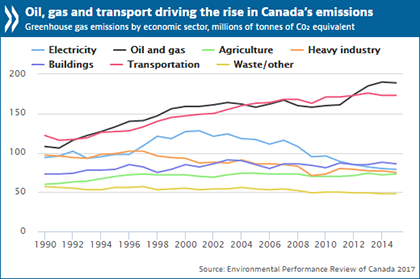Canada needs to speed up efforts to green its energy and transport sectors
A reaffirmed commitment to fighting climate change has set Canada on a greener course, but the country needs to quickly implement planned measures to reduce the carbon intensity of its energy industry, particularly in oil sands, and green its transport sector in order to progress towards its 2030 emissions goals, according to a new OECD report.

The OECD’s third Environmental Performance Review of Canada says that although Canada has reached a stage where it can grow its economy without driving up energy use, air pollution and emissions, it remains the second most carbon-intensive OECD country (after Estonia) and the fourth-biggest emitter of greenhouse gases. Rising emissions from transport and oil production mean that overall, Canada’s emissions have declined by just 1.5% since 2000 compared with an average decrease of 4.7% across the OECD area.
“We applaud Canada’s renewed determination under the current government to tackle climate change, and its leadership in international climate diplomacy at a crucial time,” said OECD Environment Director Anthony Cox. “That said, Canada’s own emissions-cutting objectives for 2030 will stay out of reach without swift and concrete policy action and greater use of economic instruments to wean the country off fossil fuels.”
While Canada’s electricity production is very low-carbon, with 82% coming from non-emitting sources like hydro or nuclear, the overall energy supply is not, with 74% coming from fossil fuels. The oil and gas industry – much of it in the province of Alberta and feeding both national needs and a large export market – accounts for a quarter of Canada’s total emissions, and the transport sector another quarter.
While emissions from electricity, heavy industry, buildings, waste and agriculture have fallen or stabilised, emissions from oil, gas and transport have risen significantly since 1990. Oil production from oil sands emits roughly four times as much greenhouse gas per barrel as conventional crude produced in North America. Alberta’s oil sands were behind much of the nearly 20% rise in emissions from oil and gas extraction in Canada over 2011-14.
In terms of progress on climate action, Canada has almost halved fossil fuel support since 2004, although support remains at provincial level. The announced phase-out of coal-fired power generation by 2030 and the planned establishment of a federal clean fuel standard should reduce C0₂ emissions from energy use. This shift is gaining international momentum with the newly launched Powering Past Coal initiative led by Canada and the UK.
Canada is also becoming a pioneer of carbon capture and storage and has made good progress on carbon pricing, with carbon taxes or cap-and-trade systems in place in the four most populous provinces and a plan under the 2016 Pan-Canadian Framework on Clean Growth and Climate Change to introduce carbon prices nationally.
On the other hand, Canada’s use of environmental taxes is the third lowest in the OECD after Mexico and the US. In a country whose vast territory means it generates a great deal more road and rail freight transport per capita, and per unit of GDP, than the average, taxes on petrol and diesel for road use are very low, as are taxes on fossil fuels for industry, electricity and heating. Pickup trucks, which make up four of the country’s ten top-selling vehicles, are exempt from the “green levy” on fuel-inefficient vehicles.
Finally, the report calls on the federal government to fully factor in environmental impacts as it decides which projects to prioritise in its infrastructure investment programme.
Key recommendations in the Review include:
● Ensure effective and timely implementation of the Pan-Canadian Framework and establish a mechanism for policy evaluation and adjustment.
● Improve consultation with Indigenous communities on environmental issues and build their capacity to meaningfully participate in decision making.
● Co-ordinate subnational climate policy and foster links between provincial carbon pricing systems. Exemptions aimed at smoothing the transition should be temporary and limited.
● Review and adjust tax, royalty and subsidy regimes that encourage fossil fuel production to meet a pledge to phase out by 2025 inefficient subsidies that encourage wasteful consumption.
● Review the taxation of energy use. In particular, reduce the petrol-diesel gap and revise taxes on fuel-inefficient vehicles to encourage the purchase of lower-emission vehicles.
● Press ahead with the Canada-US commitment to reduce methane emissions from the oil and gas sector, regardless of a US decision not to implement the commitment.
● Increase tariffs for wastewater services to secure funding for system upgrades.
Source: Organization for Economic Co-operation and Development
- 263 reads
Human Rights
Ringing FOWPAL’s Peace Bell for the World:Nobel Peace Prize Laureates’ Visions and Actions

Protecting the World’s Cultural Diversity for a Sustainable Future

The Peace Bell Resonates at the 27th Eurasian Economic Summit

Declaration of World Day of the Power of Hope Endorsed by People in 158 Nations

Puppet Show I International Friendship Day 2020

